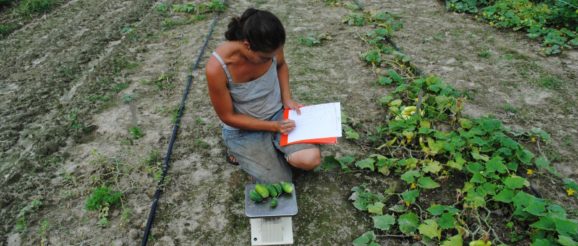$25 Million Available for On-Farm Conservation Innovation TrialsNational Sustainable Agriculture Coalition

$25 Million Available for On-Farm Conservation Innovation Trials
May 17, 2019
Earlier this week, the U.S. Department of Agriculture’s (USDA) Natural Resources Conservation Service (NRCS) announced the availability of $25 million in annual funding to advance the adoption and evaluation of innovative conservation practices on agricultural lands. The funding for on-farm trials is available as a sub-program of the Conservation Innovation Grants (CIG) program, authorized under the 2018 Farm Bill. CIGs are designed to support collaboration between NRCS and partners to implement innovative, on-the-ground conservation activities and then evaluate their impacts. Participating farmers and ranchers will receive payments to offset the risk and investments for testing out new and innovative conservation approaches.
CIG Basics
The CIG program, a subprogram of the Environmental Quality Incentives Program (EQIP), supports science-based solutions that benefit both farmers and the environment. CIG projects are intended as a stepping-stone, leading farmers toward innovative conservation management systems, approaches, and technologies.
Through the CIG program, NRCS offers competitive grants to fund
multi-stakeholder partnerships that address a variety of natural resource
concerns on agricultural land. These on-the-ground projects are funded to help
transfer technology to farmers and ranchers in order to address critical
natural resource concerns, and include on-farm pilot projects and field
demonstrations.
CIG
funding can be used to fund single or multi-year projects, though projects
should not to exceed three years. In the funding announcement, NRCS typically
provides guidance regarding the particular resource concerns or areas of
innovation to be addressed in that year’s funding pool. Resource concerns and
areas of innovation can change each year as NRCS seeks to prioritize new,
or emerging, high priority natural resource concerns.
The 2018 Farm Bill established On-Farm Conservation Innovation Trials to provide funding directly to partners, who can then offer technical assistance and payments to producers interested in implementing innovative practices on their land. NRCS is authorized to provide $25 million per year for on-farm trials: awards range from $250,000 to $5 million.
This week’s CIG announcement is specifically for the $25 million available for On-Farm Conservation Innovation Trials; NRCS will announce funding for additional opportunities through the CIG program later this year. On-Farm Trials are available for non-governmental organizations with experience working with farmers and ranchers private entities whose primary business is related to agriculture, and non-federal government agencies.
Priorities: 2019 On-Farm Trials
Each year, NRCS
identifies priority topics for On-Farm Trials. For 2019, applicants must
address one of the three following priorities:
More details on these priorities is available in the full announcement available through grants.gov.
Soil Health Demonstration Trial
Within the on-farm trials, the 2018 Farm Bill authorizes a Soil Health Demonstration Trial (SHD) component to focus exclusively on conservation practices and systems that benefit soil health and increase soil carbon. Participants in the SHD component must use consistent soil health and soil carbon assessment protocols developed by NRCS in order to evaluate the project. Projects are evaluated in terms of soil health, as well as by the economic outcomes generated as a result of the conservation practices. This option presents an important opportunity to support farmers in their efforts to build soil health, while simultaneously measuring, evaluating, and reporting on the outcomes associated with those projects.
SHD are on-farm
demonstrations of long-term, successful Soil Health Management Systems (SHMS),
and/or production systems transitioning to a SHMS. A SHMS is a collection of management
practices that focuses on increasing soil carbon and improving soil health
through the four soil health management principles: minimize disturbance,
maximize soil cover, maximize biodiversity, and maximize the presence of living
roots. National priorities within the SHD component include:
For SHD, the application also includes several geographic factors. Applicants should address regional challenges and incorporate geographic considerations into applications where possible.
How to Apply
NRCS is accepting proposals for On-Farm Conservation Innovation Trials through July 15, 2019. Applicants can apply online through grants.gov.
Additionally, NRCS will be holding a webinar to provide more information to potential applicants on May 29 from 3:00 – 4:00 pm EST.
Your email address will not be published. Required fields are marked *
